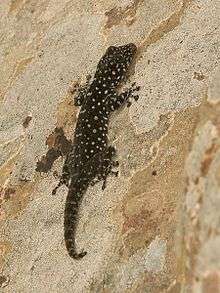Ptyodactylus
Ptyodactylus is a genus of geckos, which are commonly known as fan-fingered geckos. The genus has 12 described species.
| Ptyodactylus | |
|---|---|
 | |
| Ptyodactylus puiseuxi | |
| Scientific classification | |
| Kingdom: | Animalia |
| Phylum: | Chordata |
| Class: | Reptilia |
| Order: | Squamata |
| Family: | Phyllodactylidae |
| Genus: | Ptyodactylus Goldfuss, 1820[1] |
| Species | |
|
12, see text. | |
Geographic range and habitat
The genus Ptyodactylus is distributed across dry areas of Africa and the Middle East.
Description
The common name, fan-fingered geckos, is derived from the pattern of the straight toes which are splayed out like the pattern of a snowflake. The pads on the ventral surface of the toes are adhesive, and each toe has a retractable claw.
Species & subspecies
The following species and subspecies are recognized as being valid.[2]
- Ptyodactylus ananjevae Nazarov, Melnikov & Melnikova, 2013
- Ptyodactylus dhofarensis Nazarov, Melnikov & Melnikova, 2013
- Ptyodactylus guttatus Heyden, 1827 – Sinai fan-fingered gecko
- Ptyodactylus hasselquistii (Donndorff, 1798) – yellow fan-fingered gecko
- Ptyodactylus hasselquistii hasselquistii (Donndorff, 1798)
- Ptyodactylus hasselquistii krameri Y. Werner, 1995 – Kramer's yellow fan-fingered gecko
- Ptyodactylus homolepis Blanford, 1876 – Pakistan fan-fingered gecko
- Ptyodactylus orlovi Nazarov, Melnikov & Melnikova, 2013
- Ptyodactylus oudrii Lataste, 1880 – Algerian fan-fingered gecko
- Ptyodactylus puiseuxi Boutan, 1893 – Israeli fan-fingered gecko
- Ptyodactylus ragazzii Anderson, 1898 – Ragazzi's fan-footed gecko
- Ptyodactylus rivapadiali Trape, 2017 – Riva and Padial's fan-footed gecko
- Ptyodactylus ruusaljibalicus Simó-Riudalbas, Metallinou, de Pous, Els, Jayasinghe, Péntek-Zakar, Wilms, Al-Saadi & Carranza, 2017 [3] – Ruus al Jibal fan-footed gecko
- Ptyodactylus togoensis Tornier, 1901 – Togo fan-footed gecko
gollark: This is actually wrong.
gollark: ```Currency exchange rates from FloatRates (USD base) on 2020-10-03 3679 units, 109 prefixes, 114 nonlinear unitsYou have: 1 cubitUnknown unit 'cubit'```Troubling.
gollark: GTech™ can also set up orbital nutritional bombardment streams with food shipped from the lunar farms.
gollark: How do they get around the square cube law?
gollark: How large are these giant-children?
References
- Goldfuss, G.A., 1820. Reptilia. In: Schubert, G.H. (Ed.), Handbuch der Naturgeschichte zum Gebrauch bei Vorlesungen, Handbuch der Zoologie, vol. 3. J. L. Schrag, Nuernberg, pp. 121–181.
- "Ptyodactylus ". The Reptile Database. www.reptile-database.org.
- Simó-Riudalbas, M.; Metallinou, M.; De Pous, P.; Els, J.; Jayasinghe, S.; Péntek-Zakar, E.; Wilms, Thomas; Al-Saadi, Saleh; Carranza, Salvador (2017), "Cryptic diversity in Ptyodactylus (Reptilia: Gekkonidae) from the northern Hajar Mountains of Oman and the United Arab Emirates uncovered by an integrative taxonomic approach", PLOS ONE, 12 (8): e0180397, Bibcode:2017PLoSO..1280397S, doi:10.1371/journal.pone.0180397, PMC 5540286, PMID 28767644, e0180397
Further reading
This article is issued from Wikipedia. The text is licensed under Creative Commons - Attribution - Sharealike. Additional terms may apply for the media files.